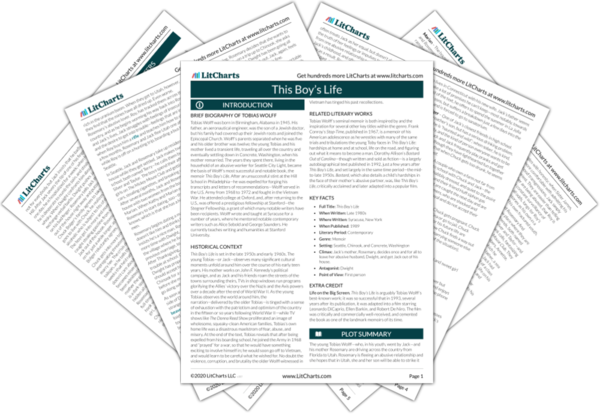Storytelling and Escapism
In This Boy’s Life, Tobias Wolff tells the story of a youth marked by violence, transience, rejection, and abuse. As the older Wolff looks back on his formative years, he recalls how storytelling functioned for him as a means of escapism—a way to stave off the pain of his actual life by imagining other lives for himself. Throughout the text, Wolff uses the theme of storytelling and escapism to suggest that in truly abusive…
read analysis of Storytelling and EscapismIdentity and Performance
Throughout the memoir, the young Jack’s abusive stepfather, Dwight, often accuses his stepson of duplicity and deception, or being a “performer.” This is true, to a certain extent; Jack is a born performer who adopts different personas depending on what any given social situation necessitates. He’s not the only one in the family, though; in their own ways, Dwight, Jack’s mother Rosemary, and even his step-siblings are all “performing” for one another…
read analysis of Identity and PerformanceAbuse
Though throughout his memoir, Tobias Wolff’s painful childhood memories are often recast in a darkly comical light or otherwise relayed in such a way that demonstrates his own worst instincts and impulses, This Boy’s Life is, at its heart, a story of the abuse Wolff and his mother suffered at the hands of his first stepfather. When Jack’s mother, Rosemary, already in flight from an abusive relationship and hoping to make a new…
read analysis of Abuse
Education
Though a good deal of the book is concerned with Wolff’s recollections of his home and family life throughout his adolescence, in many ways the world of school is the place where the young Jack discovers the most about himself. As a new kid in a small, strange town outside of Seattle, Jack must find a way to navigate his abusive home and the more banally cruel world of middle and high school. Jack’s education…
read analysis of Education






